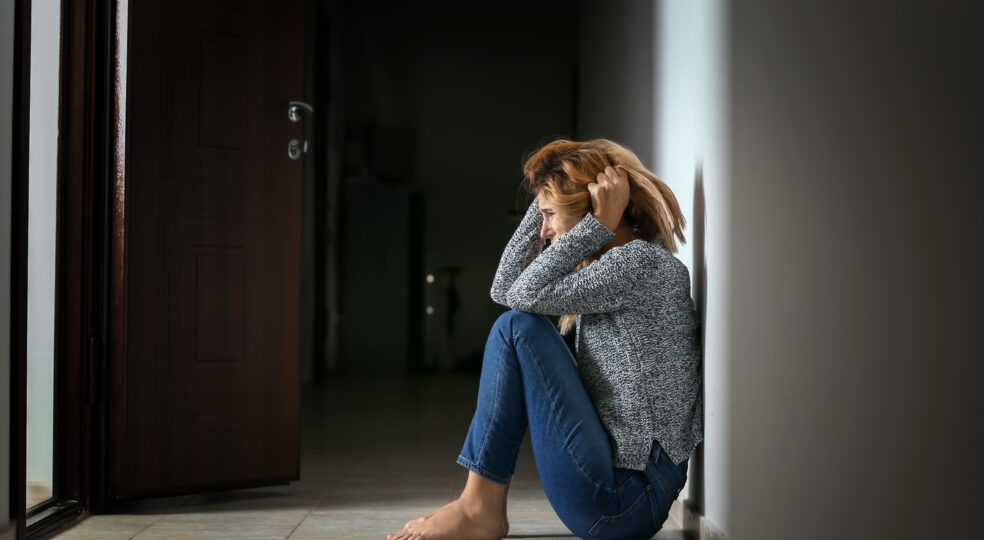
Intense anxiety that occurs suddenly and apparently without cause and is accompanied by symptoms such as palpitations and sweating is called a panic attack. The temporary episode of intense anxiety is associated with violent physical and emotional reactions.
There is no real danger to life or limb of the person affected. On the contrary - a panic attack often occurs for no reason even during relaxing activities such as listening to music, watching TV or going for a walk.
The panic attack can be so severe that one fears losing consciousness or suffering a heart attack. In reality, however, the panic state is controlled by the brain. Usually, the attack is over within a few minutes. Sometimes it takes hours to get over the anxiety attack.
Because a panic attack occurs suddenly and unexpectedly, it significantly limits the quality of life. People affected by a panic disorder live in constant fear of the next attack. A panic attack is usually harmless. If the causes of panic are known, efficient methods can help to overcome the panic.
Do you know the feeling of suddenly feeling dizzy, your hands shaking and your heart pounding? A panic attack is defined in the ICD-10 classification of mental disorders as a sudden anxiety attack. This attack can be accompanied by a wide variety of physical and psychological symptoms.
Anxiety attacks are perceived as dangerous because they start suddenly and are not due to specific situations or special circumstances. This means that an anxiety attack cannot be predicted and a panic attack can occur during sleep.
What happens during a panic attack? A panic attack is basically a false alarm by the brain. It signals a danger that is not real. Being afraid is normal. It is an important survival instinct and protects us from danger in everyday life. Panic serves as a natural fight-or-flight response. When a dangerous situation is recognized, the body releases adrenaline to focus forces to attack or run away.
During a panic attack, the nervous system suggests that there is danger. This triggers the same reactions. Panic attacks can affect anyone. We only speak of a panic disorder when the panic attacks recur at regular intervals.
Panic disorder is one of the anxiety disorders. Often similar triggers for panic attack are depression, social Phobia and anxiety are responsible. It is particularly unpleasant when the panic attack occurs at night and we wake up drenched in sweat. Panic attacks express themselves through a wide variety of symptoms.

What does a panic attack feel like? How can you recognize a panic attack? Panic differs from anxiety in that it is much more intense, also occurs without visible cause and is seizure-like.
Panic attacks can be accompanied by strong symptoms, but also by hardly noticeable discomfort. Sometimes a panic attack starts suddenly, other times the attack announces itself with mild symptoms. Often the panic is not related to a specific event or situation. So it can happen that you are lying relaxed on the sofa while watching TV and are surprised by a panic attack.
Since panic can have a wide variety of manifestations, the symptoms are often misinterpreted. Strong heart palpitations are interpreted as a harbinger of an impending heart attack, a breakout of sweat is associated with premature menopause or a physical illness. Silent panic attack symptoms in particular, such as trembling, dizziness and a feeling of weakness, are rarely recognized as an indication of panic.
Typical panic attack symptoms are:
As a rule, a panic attack does not last long. Still, it can leave you temporarily unable to act. These five steps will help you cope with panic attacks and get back to normal more quickly:
Against panic helps to relax. Relaxation methods such as progressive muscle relaxation, yoga exercises or Meditate help lower stress levels and clear your head. Realize that the perceived threat is not real. Don't get caught up in the panic. Stop the mental merry-go-round by stopping, admit negative thoughts.
Say "stop" out loud when you feel a panic attack coming on. The thought-stop method is a proven strategy from cognitive behavioral therapy. With a little practice, panicky thoughts can be interrupted by saying the stop signal out loud.
Control your breathing. People who are anxious breathe faster and more shallowly. Breathing deeply in and out can help shorten an onset panic attack. Focus on breathing. In the context of anxiety and panic attacks, the 4-7-8 breathing technique is particularly mentioned.
The procedure is to inhale deeply through the nose while counting to 4. Then hold your breath and count to 7. Now exhale deeply through the mouth while counting to 8. Repeat the breathing exercise several times until your nervous system calms down.
Reduce stress. Stressful situations put a strain on the psyche and can promote panic attacks. If possible, avoid stress factors that overwhelm and frighten you.
And if all else fails? Distraction is a good remedy against mental circles. Distract yourself by doing other things, such as reading an interesting book or listening to your favorite music. Call friends or chat online with your acquaintances. Distracting yourself helps you feel better quickly.
If panic attacks occur more frequently, psychological support can be helpful. Consult a psychologist, psychiatrist or your family doctor. Depending on the cause and severity, panic disorder is treated with behavioral therapy or confrontation therapy. You will also receive instructions for self-help.
Why do many people suffer from panic attacks, while others never feel panic? There can be many different reasons for panic attacks.
Common panic attack causes include:
Often, not just one, but a combination of different triggers is responsible for a panic attack. For example, stress at work combined with conflicts in the partnership can promote the development of panic feelings.
Often it comes in moments of Uncertainty to a panic attack. Are you worried about your job? Are you afraid your partner will cheat? A situation that you don't feel up to can trigger panic.
It is not always possible to determine the specific causes of panic attacks. However, certain correlations allow some conclusions to be drawn about the development of panic states.
In the development of a panic attack, these factors come into consideration:
It is suspected that genetic predisposition plays a major role in familial clustering of anxiety and panic disorders. Personality structure also has some influence on how people deal with anxiety and panic. Particularly sensitive people react more sensitively to negative emotions and perceive perceived threats more quickly.
A panic attack can be triggered by certain places or situations. If you don't like moving around in large crowds, you may experience panic reactions in a crowded department store, train station, or airport. If you are worried about failing at a presentation in a meeting, you may feel panic symptoms before the appointment.
However, panic attacks are by no means limited to locations or circumstances. Often, a panic attack starts "out of the blue" when you're relaxing in a recliner or having a leisurely coffee with friends. For panic feelings to develop, a number of factors must come together.
Triggering conditions also include regular consumption of alcohol and nicotine. These two stimulants, like caffeine, can lead to an increased heartbeat and other bodily reactions. If an actually normal reaction of the body is evaluated as threatening, a panic attack occurs.
In the description of side effects, some medications also mention anxiety or feelings of panic. Drug-induced panic states can be avoided by changing the drug.
A panic attack can begin suddenly or insidiously. Sudden panic attacks are usually accompanied by existential feelings of fear. Panic occurs when palpitations and heart palpitations make you fear the worst.
However, panic states can also become noticeable through sweating or freezing. Mild panic attack symptoms are, for example, sweaty hands, muscle cramps in the neck area or trembling.
Often, panic begins with frightening thoughts or exaggerated fears. At the beginning of a panic attack, there are often catastrophic thoughts. The fear of a warning or even losing one's job just because one arrives a few minutes late at the workplace is a typical example of irrational thinking.
The panic attack is a temporary phenomenon. It does not last long and passes mainly within five to ten minutes. In some cases, the symptoms last longer, so that the panic attack is overcome only after half an hour or after several hours. As a rule, an attack subsides on its own.
Rarely does a panic state last all day. Fear of a panic attack can increase its duration and intensity. If you avoid situations or activities that have caused you to feel panic in the past, you are perpetuating panic attacks. The avoidance behavior causes the panic to become stronger. If you want to cope with panic attacks, it is important that you face your fears!
A panic attack - what to do? If you feel panic-like feelings rising up inside you, don't hesitate, act immediately! Use these 5 effective tips.
Feel inside yourself. How do you feel? Analyze the situation. A threatening scenario loses its terror when you realize that the feelings of panic do not correspond to reality. Keep calm. Apply the breathing technique, breathe consciously and focus on your breathing.
Drink a sip of water. Drinking water helps against inner restlessness. Dehydration causes the release of cortisol in the body. The stress hormone signals the organism that it is in the highest danger.
Speak encouragement to yourself. Use a Courage making mantra, such as "I can do this," to dispel feelings of panic.
A panic attack can occur at any time. The reasons for panic attacks are manifold. However, there are effective measures that are already helpful at the first signs of a panic attack.
You can overcome mild panic feelings with our tips. Behavioral therapy, confrontation therapy and other psychological methods have proven helpful for regularly recurring panic states. The panic attack is a form of exaggerated fear, which can be well managed with a suitable approach.
By the way, meditating regularly is a wonderful way to let more peace come into you. Meditation is both an effective way to manage panic attacks, whether you are in the midst of one, and to lower your stress level and reduce the likelihood of having a panic attack in the first place.
If you integrate meditation as a ritual into your everyday life, you will soon notice how fear loses its effect more and more! When you open yourself completely to this experience, you will also notice how the problem to which you once gave such great importance suddenly becomes trivial and small.

